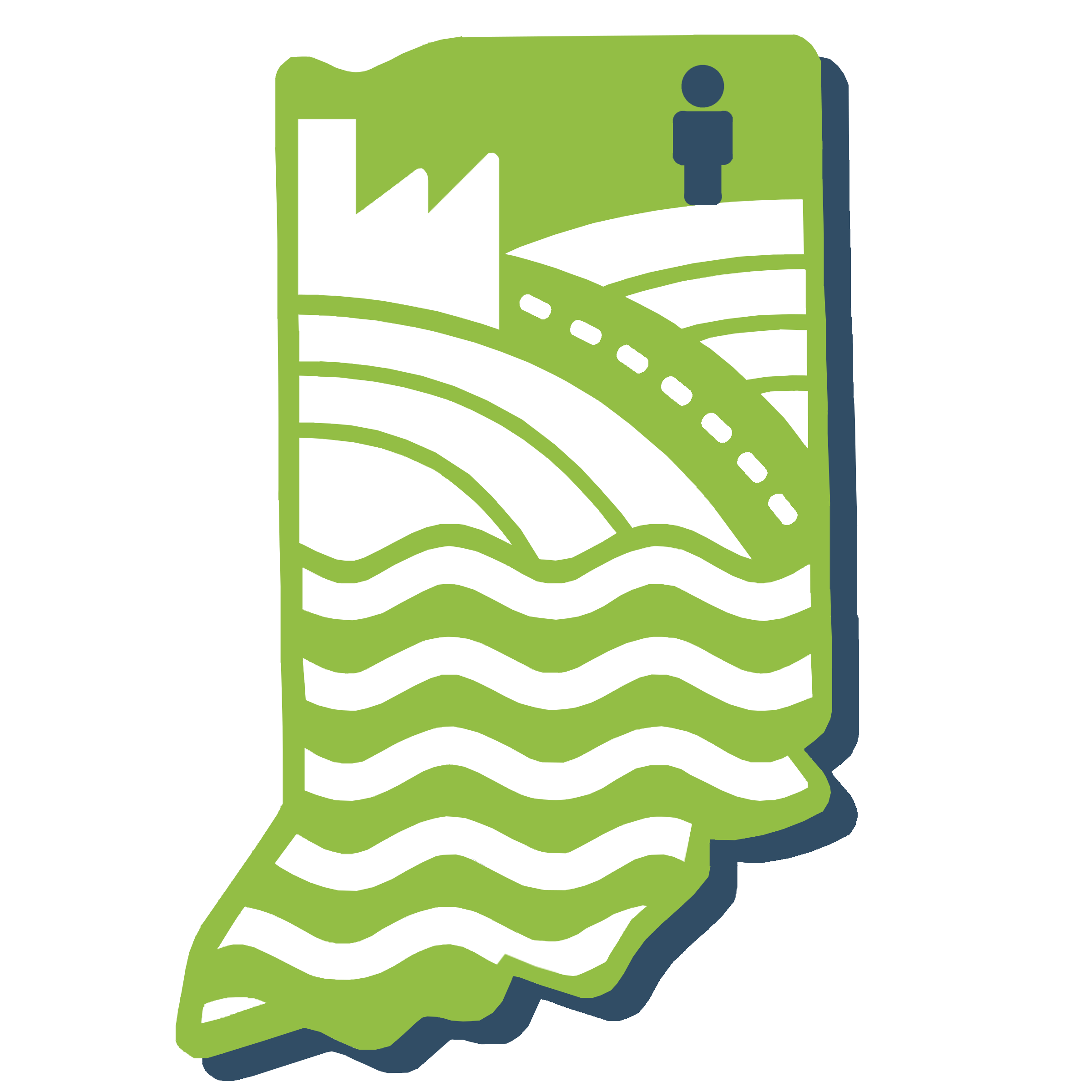In 2019, local business leaders, elected officials, and internet service providers (ISPs) came together to discuss broadband services in Noble County. Since then, thousands more addresses have joined the ranks of high speed internet customers. Thousands more, however, still have no or few options to experience reliable, high-speed broadband connectivity at rural home and business addresses.
Noble County Economic Development (EDC) wants residents and businesses to know that progress is being made and encourages them to participate in the Indiana Speed Test, a crowd-sourced measurement of internet speeds created to help bring reliable broadband service to the most unserved and underserved communities across Indiana. The test is made possible by a coalition of organizations, including Indiana Farm Bureau. Participation in the Indiana Speed Test may help Noble County receive future funding for broadband expansion, particularly across more unincorporated areas of the county.
The test takes less than one minute to complete using any internet connected device and does not collect any personal information. The data derived, however, may prove critical as ISPs compete for funding, because when conflicts arise the data may be used to prove the level of service available at a specific address. Anyone at an address not currently, consistently served by a minimum of 25 megabits per second (Mbps) upload and 3 Mbps download is encouraged to participate by going to https://www.infarmbureau.org/resources/broadband-speed-test.
Why high speed broadband matters
Broadband remains a hot topic of conversation in economic development for many reasons, not the least of which is the potential peril of not making it a priority. Broadband enhances quality life by delivering streaming video and other entertainment options, work-at-home opportunities, e-learning, and telehealth options. But it also has become a critical component of attracting people and growing population and the economy.
“If our employers are going to grow and high wage job opportunities are going to follow, we must have reliable, high-speed broadband connectivity,” explains Gary Gatman, executive director of Noble County EDC. “We all need to be connected. It affects our ability to grow populations, households, and jobs. All of those things are possible, but more likely with broadband connectivity and certainly will take less time to accomplish with it,” Gatman says.
Industry 4.0 is a term coined for the fourth industrial revolution, based on the use of digital communication in manufacturing. Companies already in the midst of Industry 4.0 are using cloud-based digital computing to run and monitor machines, perform quality control tasks, and more. Noble County has seen a decline in manufacturing jobs over the past few years, yet still ranks fourth in the nation for concentration of jobs in the sector. In order to sustain and grow manufacturing jobs, the county must have all the necessary infrastructure in place.
“If employers are successfully going to deploy Industry 4.0 technology, they have to have the infrastructure to do it. That infrastructure is high speed fiberoptic broadband. We are seeing unprecedented opportunities in Indiana to compete for new business. High speed internet is not a competitive advantage, it is an absolute requirement like electricity and running water.”
Gary Gatman, Executive Director, Noble County Economic Development Corporation
Why broadband expansion takes time
Unlike other, traditional infrastructure projects, the expansion of fiberoptic broadband in rural areas is so costly that it almost always requires public-private partnerships to occur. The local installation of fiberoptic lines costs an estimated $25,000 to $50,000 per mile, depending on whether fiber is run underground or above ground using utility poles.
Installing several rural miles of fiberoptic networking in less densely populated areas stands to gain few, if any, new customers. If the number of customers signing up for new or enhanced service is low, the rate of return on investment is also low, and slow. This is why some governments are investing alongside ISPs, to reduce the risk while accomplishing the overall economic development goals to enhance quality of life, livability, and workability more quickly.
Digital literacy, or a lack thereof, is also a common obstacle to broadband expansion in rural areas. The term is loosely defined as finding and consuming, creating, communicating, and sharing digital content. Not all consumers value or fully understand the expanded opportunities that high speed broadband connectivity can provide. This leaves some unlikely to pay higher fees for faster speeds, more bandwidth, and greater reliability over DSL, wireless, or satellite service. Those who desire more opportunities to consume and exchange digital content, gain efficiencies in their work, and experience greater reliability while online are most likely to pay a higher fee for fiberoptic broadband connectivity.
A slow rate of new customer growth, long material lead times, and high demand for a limited number of installation contractors often leads ISPs to prioritize expansion of services to the more densely populated areas first, delaying expansion to more rural ones.
Noble County has an advantage
Noble County is currently served by over a dozen ISPs, several of which have been awarded federal and state grants and are executing planned expansions. Ligtel Communications is among them, and a local partner that may be Noble County’s greatest asset in terms of broadband expansion thanks to the company’s desire to see fiberoptic internet service expanded to benefit Noble County.
While other technologies can deliver internet service (DSL, wireless, satellite, etc.), fiberoptic internet offers connection reliability and speeds that are unmatched. In that arena, Ligtel is joined by few others offering fiberoptic internet connectivity in Noble County. Ligtel is the only ISP that has been seen aggressively working to add more rural addresses to their northeast Indiana fiber network over the past two years.
Also known as Ligonier Telephone Company, Ligtel has roots that run deep in Noble County. As the company celebrates 125 years of service in 2021, it is driving hard to provide fiberoptic internet to more rural households and businesses. In 2020, Ligtel became a member of the network of Smart Rural Community providers, further illustrating their community commitment by helping Ligonier become a “gig community” and the second most connected city in Indiana (according to Broadbandnow.com). The company’s current work plans extend beyond Ligonier, according to Randy Mead, General Manager.
“Ligtel wants to see all of Noble County ultimately served by fiberoptic internet. We are driven to serve Noble County and northeast Indiana because this is where our customers, and our employees, live and work. We want our community and our customers to thrive. Our business relies on it.”
Randy Mead, General Manager, Ligtel Communications
Mead, a former mayor in Dubios, Idaho, joined Ligtel in 2017. Under his leadership Ligtel most recently installed a fiberoptic network in the town of Shipshewana. Over the past two years the company has expanded fiber to serve more addresses in Albion, Avilla, Kendallville, Wolcottville, and Wolf Lake, and places in-between. While wireless providers have simultaneously been working in other parts of the county, Ligtel has made the most notable impact to local broadband connectivity through fiberoptics.
Mead says Ligtel’s more immediate work plans include connecting some area lake communities and, after that, to help close the digital divide in less densely populated parts of Noble County. A recipient of multiple grants, Ligtel is an asset that very few communities have. Their commitment to serve an exclusively local customer base sets them apart from national competitors. The company recently announced plans to expand their headquarters in downtown Ligonier and add a new data center in LaGrange County.
Ligtel has shown an extraordinary willingness to collaborate with other partners in the county, discuss expansion strategies, and help work through common challenges in order to help expedite the process and bring greater, long-lasting rewards overall.
“We know this work has to be done,” Gatman continued, “so we greatly appreciate all of the private conversations Ligtel, and others, have been a part of frequently this year. For quality of life, economic growth, and so that businesses can access and use emerging technologies, it simply must happen.”
More funding is expected to be made available in Indiana over the next 12 to 24 months. If armed with the right data, the kind that the Indiana Speed Test can collect, Noble County will be in a better position to compete. To learn more about Ligtel, visit www.ligtel.com or call (260) 894-7161. For more information about broadband in general, watch a video by Purdue University’s Center for Regional Development at https://www.youtube.com/watch?v=vKpU6nFlnL8. Questions may also be directed to Noble County Economic Development Corporation at (260) 636-3800.



